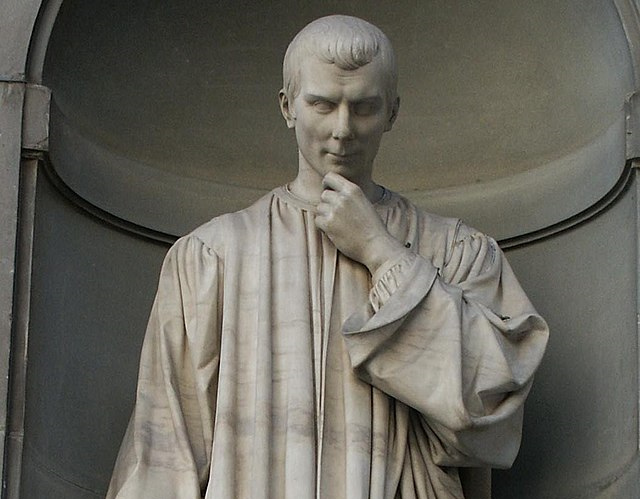A Summary of The Prince by Niccolò Machiavelli Part 2

Intro
The Prince is considered one of the founding books of the modern international political school of thought, Realism. This post is a continuation of my series on The Prince, by Niccolò Machiavelli. In the previous part, I did a summary of chapters one through six. In this next part, I will look at chapters seven through eleven. Let's continue to look at Machiavelli's arguments. This is only a simple summary of these ideas, if you want the full ideas of Machiavelli’s The Prince, I suggest reading the whole book yourself. My goal is to try to make The Prince simple and concise.
Chapter VII: Concerning New Principalities Which Are Acquired Either by the Arms of Others or By Good Fortune
“A private citizen who becomes a ruler out of sheer good luck needn’t make much effort to take his state but will have to sweat if he is to hold on to it.”
Chapter seven of The Prince will be the first chapter covered in this summary post. Machiavelli proposes that sometimes normal, private citizens become princes by good fortune. This is in contrast to someone that gained the ability to be a prince through their own prowess or determination. He goes on to say that there are a few different ways that a prince may acquire the title of prince, in this vein. They can acquire their power through buying their way, receiving favors from someone else in power, or even bribing soldiers.
These princes are considered weak by Machiavelli. This belief is for a few different reasons: the fact that the prince doesn’t know how to maintain their power, don’t have loyal troops, they don’t know how to deal with problems, command troops, or keep power in the face of opposition. These problems don’t only make the prince weak, but will cause issues with their reign further down the line. However, a prince that acquires power through their own prowess has built a strong foundation on which to rule. A strong foundation for which a prince’s power is built is an important factor in how the prince will be able to rule. Those that gained power through fortune or goodwill lack this foundation. They will have trouble building such a foundation quick enough to prevent power from being usurped from them.Chapter VIII: Concerning Those Who Have Obtained a Principality by Wickedness
“Cruelty is badly used when you’re not drastic enough at the beginning but grow increasingly cruel later on, rather than easing off.”
Chapter eight is an interesting chapter, to say the least. This chapter looks at a prince that may have come to power by what may be considered as immoral means. Machiavelli looks at those that came to power through crime, killing fellow citizens, and betraying friends. Machiavelli sees these kinds of rulers as treacherous, pitiless, and irreligious. He also says princes who commit criminal acts to gain their rule will never gain glory. This is because their reputation will forever be tarnished. This is not to say that the prince can't use cruelty. Hell, this wouldn’t be Machiavelli if that was the case. It is just that the use of cruelty must be for a ‘good reason.’ Specifically, the prince can use cruelty for purposes of self-defense and for the greater good of one's subjects. Cruel actions used frequently and unnecessarily, gives the ruler a reputation that falls into infamy.Machiavelli continues this line of thought in chapter eight with explaining the best ways to use cruelty. After a prince decides to seize a state, they need to decide how much injury to inflict. Too much injury or too little injury can have their own consequences. Machiavelli suggests to strike all at once. In other words, try not to drag out any cruelty for a prolonged amount of time. If done in such a way, there lies a possibility the prince’s subjects will eventually forget the violence that was deemed necessary by the prince. This will cause the resentment to fade away and the subjects to come to appreciate the benefits of the prince’s rule. Perhaps one day, the prince’s cruelty will even become justified in the minds of the prince’s subjects.
Chapter IX: Concerning A Civil Principality
“Obviously, to take control of this kind of state you need the support of either the common people or the wealthy families, the nobles.”
Chapter nine focuses on the civil principalities, as the chapter’s title implies. Machiavelli suggests the citizenry of a population tends to be made up of two groups: common people and nobles. The common people naturally try to avoid domination. Though, they are still oppressed by the nobles. In this vein, nobles naturally dominate and oppress the common people. The power to form principalities tend to come from either the nobles or the people. When the nobles can’t dominate the common people as they are naturally desired to do, they will try to strengthen one of their own to a prince. This is, obviously, with the goal to properly dominate the common people. Inversely, the people, when they can’t withstand the nobles' domination, will make one of the common people a prince with the hopes of being protected by the prince's authority.Machiavelli continues this train of thought in chapter nine and explains what each possibility may bring the prince. A prince who is put in place by nobles would find it more difficult to maintain his power. This is because the other nobles will consider themselves his equal. Afterall, the prince was once one of them. However, a prince selected by the common people stands at the top of society alone. The elevation from commoner to prince is such a large jump in classes that the same concept doesn’t ring true. At the end of the day, the common people have a simple desire of being left alone. This should be relatively simple to achieve compared to the desires of the nobles. All and all, the only thing the common people will respond to a prince for which they are unhappy with is deserting them. This is can be a major blow, but not to the degree for which the nobles may respond. The nobles, on the other hand, will intertwine desertion with opposition, making the nobles a powerful problem in keeping the prince’s rule.
Machiavelli takes a closer look into nobility. Nobles can be divided into two different groups. The different groups are those that are dependent on the prince, and those that are independent of the prince. The prince should honor and love the nobles that are dependent on him and his rule. Afterall, these nobles can make somewhat powerful allies. Independent nobles can be further divided into timid nobles or ambitious nobles. The prince should ignore the timid nobles as benign. However, ambitious nobles may one day be an enemy during times of adversity. This causes the prince to need to always watch out for independent nobles. Now let’s look at the common people.
The prince must retain the people's friendship. Machiavelli sees this as a fairly easy task. The best way to achieve this is by benevolence. The people that expect hostility will feel obligated to their prince if they are instead treated with kindness and favors.
Finally, Machiavelli looks at the magistrates within a state. He argues that a prince can rule directly or through magistrates. Ruling by magistrates is a risky way to rule as it makes the prince vulnerable. This forces the prince to take in account the will of the magistrates. In rough times, like nobles, the magistrates may always just depose the prince. Afterall, the people will grow used to obeying the magistrates rather than the prince. This makes the magistrates a powerful force. A prince who is wise will always ensure that the people are dependent on his authority and not anyone else’s.
Chapter X: Concerning the Way in Which the Strength of All Principalities Ought to Be Measured
“When looking at the nature of these various states one important question to ask is: if attacked, does a ruler have sufficient power to defend himself with his own resources, or will he always have to rely on the protection of others?”
Chapter ten is a relatively short chapter in comparison to other chapters, especially given the information in chapter nine. Machiavelli argues that the prince should keep an army of size and strength of his aggressors. On top of that, it is important for the prince to keep defenses and fortifications. Defenses are not only important ends unto themselves, but also in hopes of deterring attacks. A prince who has adequate defenses can inspire his people in times of distress. He can do this by convincing their subjects that hard times are only temporary. This gives the population hope and belief that better times are coming soon.Chapter XI: Concerning Ecclesiastical Principalities
“Only Church leaders possess states without defending them and subjects without governing them.”
Lastly, for this post on The Prince is chapter eleven. Machiavelli focuses this chapter on ecclesiastical principalities. These are regions under the control of the Catholic church. Some have considered this a controversial chapter for the times that this book was written. Machiavelli up front admits that taking control of these principalities is difficult. He claims that these principalities are ruled by religion, rather than a government. He claims this with a scent of sarcasm. This means the prince doesn’t even have a need to govern such a principality. They have no need to be defended nor their subjects require any administration. These states are always secure and happy. Again, one wonders how much sarcasm is being placed on such a principality. He argues this because they are sustained by higher powers from which the normal human can’t begin to comprehend. It would be presumptuous to try and further understand why this is the case.
